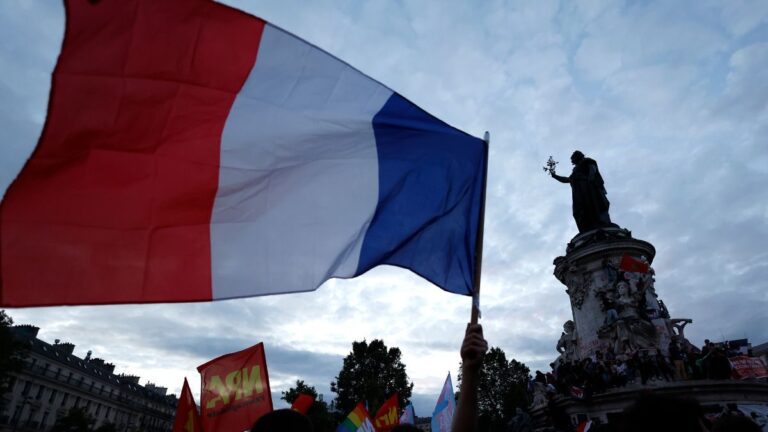French politics seems to be in disarray. The parliamentary elections unexpectedly resulted in a coalition of left-wing parties winning the most seats but failing to secure a majority. Marine Le Pen’s far-right National Rally party, which won in the first round, suffered a major defeat in the final results.
Despite winning the most seats, the New Popular Front (NFP), a coalition of parties ranging from the far-left to the moderate Socialists and Greens, cannot form a government because it did not have an absolute majority.
French President Emmanuel Macron has dissolved the country’s National Assembly and called for early general elections following his party’s defeat in last month’s European Union elections.
What was the outcome?
According to the French Interior Ministry, the NPF won 182 seats in the 577-seat National Assembly, making it the party with the most votes, but fell short of the 289 seats needed for an absolute majority.
After slumping to a dismal third place in last Sunday’s first round of voting, President Emmanuel Macron’s centrist Ensemble coalition bounced back strongly to win 163 seats. Despite leading in the first round, Marine Le Pen’s far-right National Rally (RN) party and its allies won 143 seats.
After the first round of voting, more than 300 seats went to a runoff election between Ensemble, the NFP and the RN. By Tuesday, more than 200 centrist and left-wing candidates had withdrawn from the second round to avoid splitting the vote.
The RN’s strong performance in the first round of voting raised concerns that France could elect a far-right government for the first time since the collaborationist Vichy regime during World War II.
What next?
French Prime Minister Gabriel Attal, who is due to resign with the Paris Olympics looming, said he was ready to stay on in his position “as long as the job demands” – with three years left on President Macron’s term.
“Our country is facing an unprecedented political situation and is preparing to welcome the world in the coming weeks,” Prime Minister Gabriel Attal said.
When Macron flies to Washington this week for a NATO summit, he will leave without a clear idea of who will be his next prime minister – and may be forced to share power with politicians who strongly oppose his policies.
Will a coalition be formed?
After parliamentary elections, the French president appoints a prime minister from the party that wins the most seats. Typically, the candidate is chosen from the president’s own party, but this time Macron faces the possibility of having to appoint someone from the left-wing coalition known as the “Coexistence” pact.
France has never seen a coalition government after an election, something that is quite common in Nordic parliamentary democracies such as Germany and the Netherlands.
The Fifth Republic, designed in 1958 by war hero Charles de Gaulle to give the president a large and stable parliamentary majority, created a confrontational political culture with no tradition of consensus or compromise.
Jean-Luc Mélenchon, leader of the far-left Independence France (LFI) party, rejected the idea of a broad coalition and said President Macron had a duty to call on a left-wing coalition to take power.
On the centrist side, Macron’s leader, Stephane Séjourne, is open to working with mainstream parties but has ruled out any pact with Mélenchon’s Liberal Democrats. Former Prime Minister Édouard Philippe has also ruled out any pact with the far-left.
Macron himself said he would wait until the new parliament had established some kind of “structure” before deciding on his next steps. “In his role as guarantor of our institutions, the president will ensure that the sovereign choice of the French people is respected,” the Elysee Palace said in a statement.
What if no agreement can be reached?
According to the constitution, Macron cannot call new parliamentary elections for the next 12 months, but he can decide who he asks to form a government. Whoever he chooses will be subject to a vote of no confidence in the National Assembly, which convenes for 15 days from July 18.
Another possibility is a technocratic government that manages day-to-day operations but does not oversee structural change.
It is not clear whether left-leaning forces would support this scenario, which would still require parliamentary support.
Macron’s gamble backfired
The early elections were meant to give Macron some momentum after his EU defeat, but Sunday’s results showed that the far right is real and stronger than ever ahead of the 2027 presidential election.
Before the election, Macron had the most power in parliament. Now, as prime minister, he will likely have to work with opposition politicians. “His authority at home and his credibility abroad are undermined,” Macron said in the article. POLITICO.
Top Videos
Show all
Worli hit and run case: Mumbai: Two arrested in Worli BMW hit and run case | News18
Hamas drops key demand, reveals possibility of ceasefire
Three children killed in Sydney house fire, police suspect murder
Iran elects president who wants to resume nuclear talks with the West
Holland upsets Turkey at Euros, England reaches semi-finals
Former French Prime Minister Edouard Philippe, an ally of Macron, said Macron’s gamble had further complicated the situation. “The reality is that no political bloc in Parliament has a majority that can govern on its own. The dissolution of Parliament was intended to clarify the situation, but instead it has created greater ambiguity,” he said Sunday night. CNN.
(With input from relevant agencies)
First revealed: July 8, 2024, 10:40 AM

